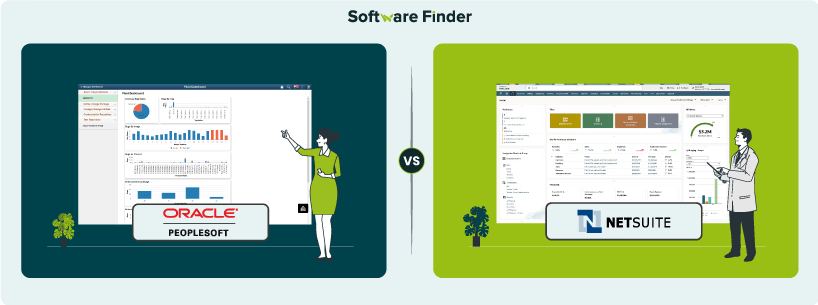
Choosing suitable enterprise software can significantly impact how well your company manages its operations, encompassing areas such as human resources (HR), finance, project management, and customer relationships. Oracle PeopleSoft and NetSuite are two prominent systems in this market, each providing extensive features tailored to specific business requirements.
While both platforms offer key functions, like human resource management and financial management, their setup, deployment, and use vary significantly. This comparison outlines their key features, strengths, limitations, and pricing to help you determine which option is best suited for your organization's needs.
Features | PeopleSoft | NetSuite |
Human Capital Management (HCM) | Robust global HR suite with compliance tools, workforce automation, and real-time analytics | Unified, cloud-based HCM with integrated payroll, self-service, and role-based dashboards |
Financial Management | Full ERP with GL, AP/AR, budgeting, and compliance features, asset lifecycle tracking | Real-time, AI-powered financials with automation, compliance, and deep integration |
Project Management | Feature-rich Oracle integration with resource matching, billing, and grant management | Real-time tracking, quick setup, and full financial integration |
Customer Relationship Management (CRM) | AI-powered CRM with campaign management., service, and omnichannel engagement | End-to-end CRM with full customer lifecycle, automation, and 360° view
|
Reporting And Analytics | Embedded analytics, Kibana integration, and strong reporting tools (BI Publisher, nVision) | SuiteAnalytics with real-time dashboards, trend tracking, and no-code reporting |
Pricing | Starts from $85/user/month for Benefits module | Starter Edition: $20,000-$65,000 for up-to 15 users |
Oracle PeopleSoft is a comprehensive suite of enterprise solutions designed to meet advanced business needs across multiple sectors.
It provides integrated solutions in Enterprise Resource Planning (ERP), Human Capital Management (HCM), supply chain management, financial management, performance management, and enterprise service automation.
Unique Features Of PeopleSoft
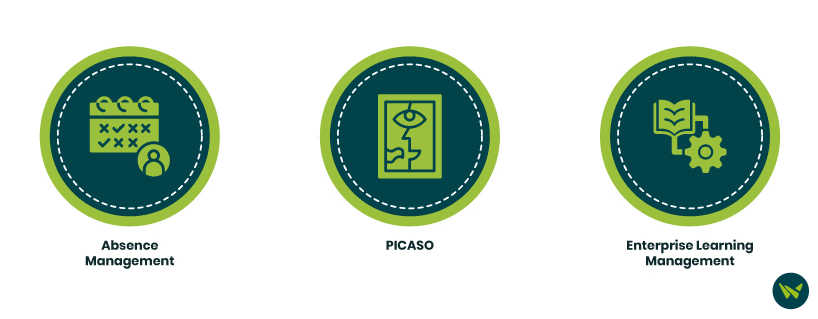
- Absence Management: Automates employee absence tracking and management with configurable rules, self-service, real-time forecasting, and seamless integration to help improve compliance and workforce planning
- PICASO: It is an AI-powered digital assistant that uses natural language chat to simplify processes like managing payroll, absences, and expenses. It provides seamless, tailored assistance on both desktop and mobile platforms, increasing efficiency and customer experience
- Enterprise Learning Management (ELM): Streamlines employee development by linking training to business objectives. It facilitates various learning formats, monitors compliance, integrates with talent management, and efficiently enhances workforce skills
Pros And Cons
Pros
- User-friendly interface makes the system accessible to a wide range of users
- Robust report and query development capabilities help enhance data analysis
- Customizable favorites list simplifies navigation through complex menus
Cons
- Reporting updates are complex; backdated changes require deleting later entries, making the process complicated
- The user interface feels outdated and disconnected from usual business workflows, negatively impacting its usability
NetSuite is a leading cloud-based business management platform that integrates financials, ERP (Enterprise Resource Planning), CRM (Customer Relationship Management), and e-commerce features.
It serves over 42,000 companies and aims to help businesses grow by offering a comprehensive, AI-powered platform for managing various business processes.
Unique Features Of NetSuite
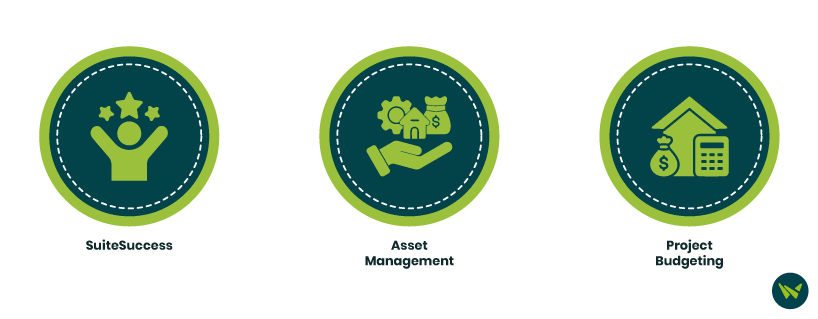
- SuiteSuccess: is a comprehensive, industry-tailored deployment and business-optimization framework that provides pre-configured, industry-specific solutions with built-in workflows, dashboards, and KPIs. It enables fast deployment and continuous business optimization from a single cloud platform
- Asset Management: centralizes tracking of fixed, customer, and sub-asset information from installation to retirement. It addresses hierarchies, usage history, costs, warranties, automated maintenance, and analytics
- Project Budgeting: allows for detailed budgeting of labor, costs, and purchases per project, comparing actuals vs budget forecasts, scenario planning, and reporting for proactive financial monitoring
Pros And Cons
Pros
- Real-time data access ensures that all information is updated instantly
- Efficient inventory management with real-time stock level monitoring and automatic updates
- Demand and supply planning helps streamline the Procure-to-Pay cycle for better purchasing efficiency
Cons
- Extensive custom scripts make troubleshooting and resolving issues more complex and time-consuming
- Rigid billing schedules, require separate setups for different terms, making them challenging to manage
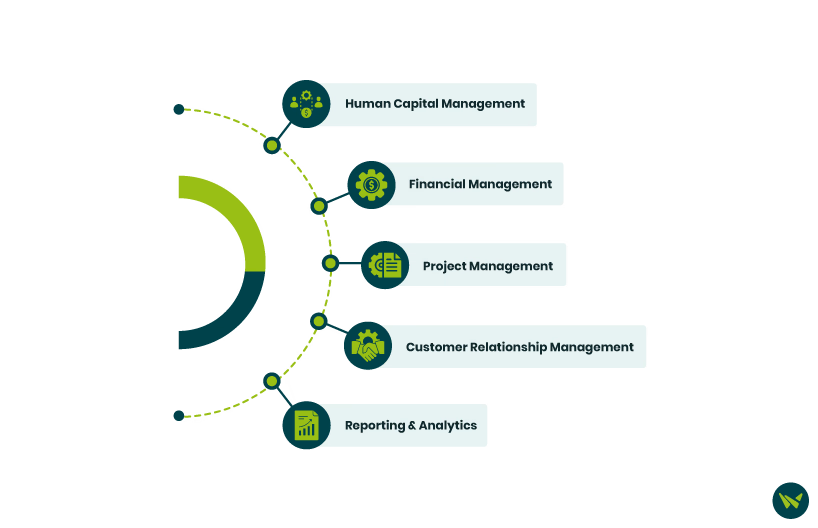
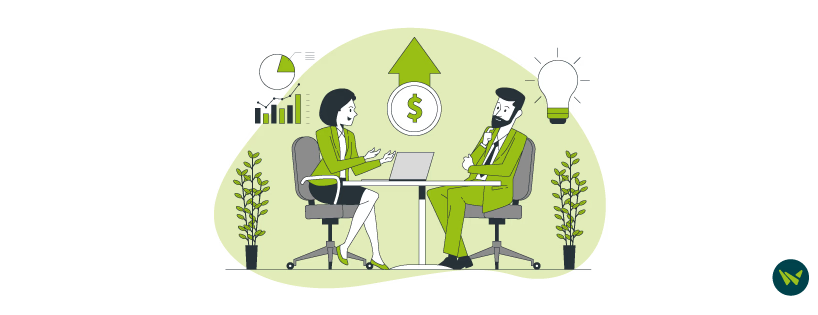
PeopleSoft HCM by Oracle offers four pricing tiers based on modules:
- Benefits: $85/user/month
- Pension Administration: $85/user/month
- Human Resources: $185/user/month
- Payroll: $225/user/month
Disclaimer: The pricing is sourced through a third-party website and is subject to change.
Each module is priced separately on a per-user, per-month basis, allowing organizations to select only the functionality they need.
NetSuite pricing varies widely depending on the number of users and modules. A general estimate suggests:
- Starter Edition: $20,000-$65,000 (licenses + services) for up-to 15 users
- Emerging Edition: $35,000–$85,000 (licenses + services) for 30 users
- Mid-Market Edition: $35,000 to $125,000 for mid-sized businesses with multi-entity needs
- Enterprise Edition: $250,000 (for large operations with over 1,000 users)
Disclaimer: The pricing is sourced through a third-party website and is subject to change.
The pricing for each edition is based on the features offered and scalability.
PeopleSoft and NetSuite have outstanding capabilities for business operations, but their strengths are tailored to distinct business needs. PeopleSoft excels in compliance-driven environments that demand advanced HR, financial, and asset management capabilities, supported by Oracle's enterprise solutions.
On the other hand, NetSuite offers a more agile, cloud-native platform with real-time visibility, integrated workflows, and AI-powered automation, making it an ideal choice for growing businesses seeking speed and scalability.
Your business structure, industry requirements, and long-term goals determine the right choice. Consider which system best suits your digital strategy and operational complexity.
